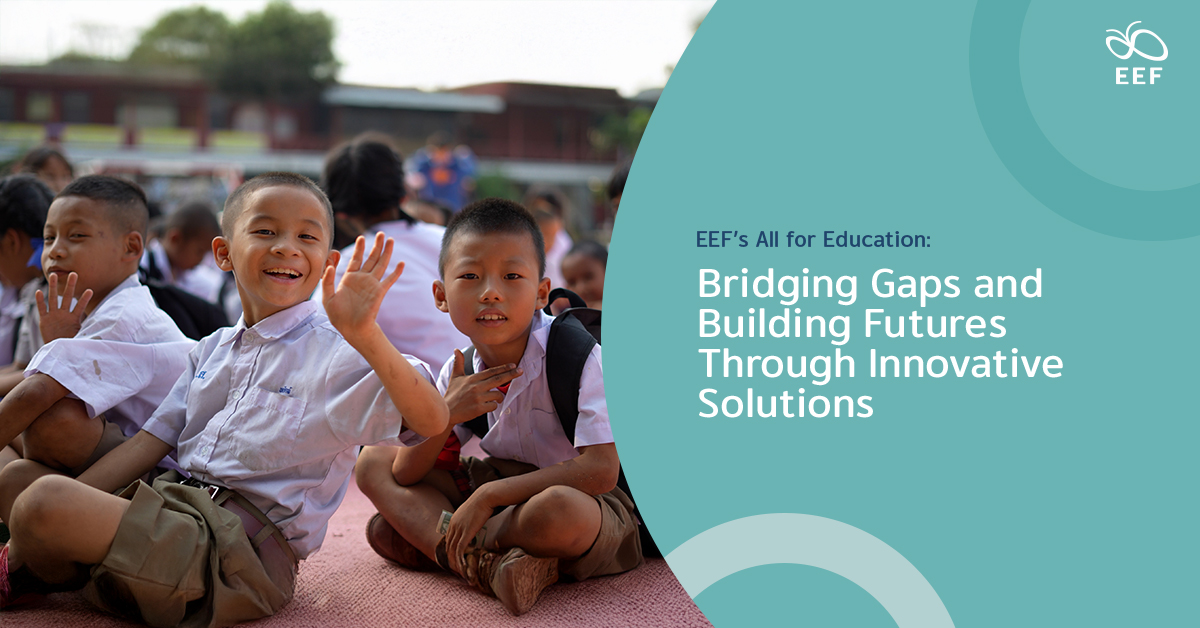
The Equitable Education Fund (EEF) Thailand’s mission to bridge the gap of educational inequality is encapsulated in “All for Education,” an initiative designed to collaborate with private sector partners through innovative financial mechanisms. By developing tools that expand opportunities for socio-economically disadvantaged youth — those from households with average incomes below the poverty line — the initiative confronts an alarming reality: over 1.02 million children in Thailand remain out of school, while 2.8 million more teeter on the brink of dropping out. Swift action to reintegrate these children and prevent further attrition must, therefore, take precedence.
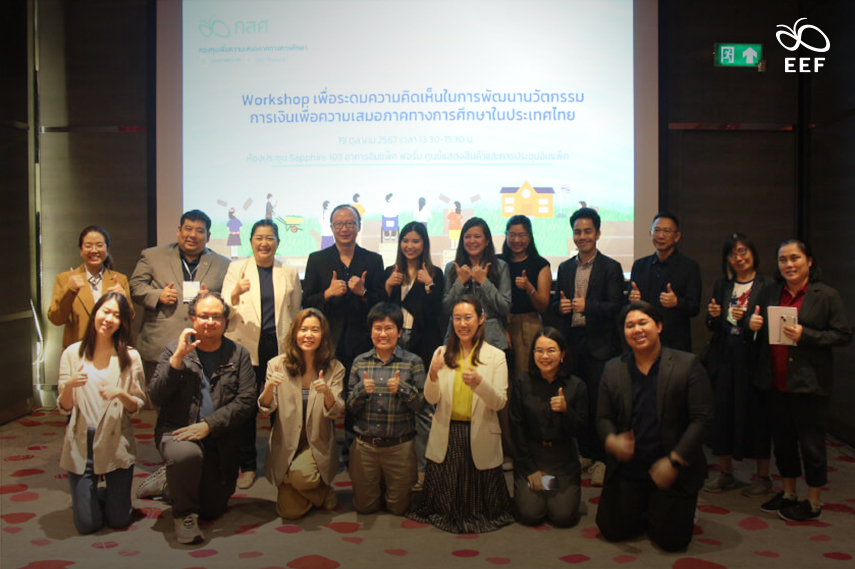
Noteworthy has been the EEF’s recent collaboration with leading organisations, including Central Group, SCG Foundation, Banpu Public Company Limited, KPMG Thailand, Sarn Palang Social Enterprise, and Yuvabadhana Foundation. Not only have these partnerships fostered meaningful dialogue, but they have also organized workshops to develop financial frameworks tailored to combat inequality. Among the standout projects is the “Angel Teacher” program in Phetchabun Province. Supported by Bangkok Bank and Yuvabadhana Foundation, this initiative empowers teachers to assist at-risk children while coordinating efforts across schools, healthcare facilities, and local agencies. Expanding its impact, the program has extended to four pilot schools in Narathiwat, Sing Buri, and Nakhon Pathom under the network of “Moral Schools.”
No less impactful is the “KPMG Scholarship” project, which builds financial literacy, technological competence, and business acumen among youth, while enhancing private sector engagement in education. Progress is meticulously monitored every three months, enabling continuous improvement in underserved communities. Complementing these efforts is the seminal “ZERO DROPOUT: All Children Go to School” project in Ratchaburi, which utilizes social bonds for transparency and sustainability. This initiative centralizes provincial collaboration between public and private sectors, ensuring continuity even in the EEF’s absence.
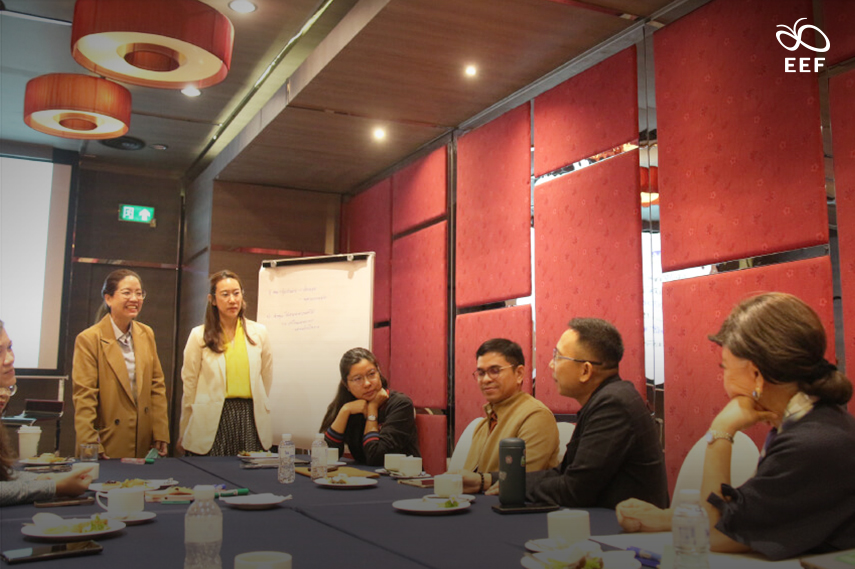
Beyond addressing educational access, the EEF has pioneered innovations fostering equity. Programs such as “Caregiver Training for the Elderly” and “Vocational Training for Juvenile Detainees” focus on equipping vulnerable groups — impoverished students in the “Poor” and “Very Poor” groups according to the EEF’s criteria and youth in juvenile observation and protection centers — with practical, life-enabling skills. Similarly, the “AI Trainer Employment” project in collaboration with 60 partner organizations empowers individuals with disabilities to prepare data for AI development, enabling systems to simulate human thought and language. In parallel, Central Group leads teacher training efforts to deepen educators’ roles in reducing inequality, catalyzing systemic change while bolstering economic resilience. Additionally, the Yuvabadhana Foundation has further proposed four strategies: leveraging inter-agency connections, pooling resources for marginalized children, integrating financial education into projects, and employing online platforms and influencers to amplify outreach.
Key to tackling educational inequality and fostering long-term economic growth is the EEF’s scaling efforts through a comprehensive strategy that targets key areas of education, workforce readiness, and systemic transformation.
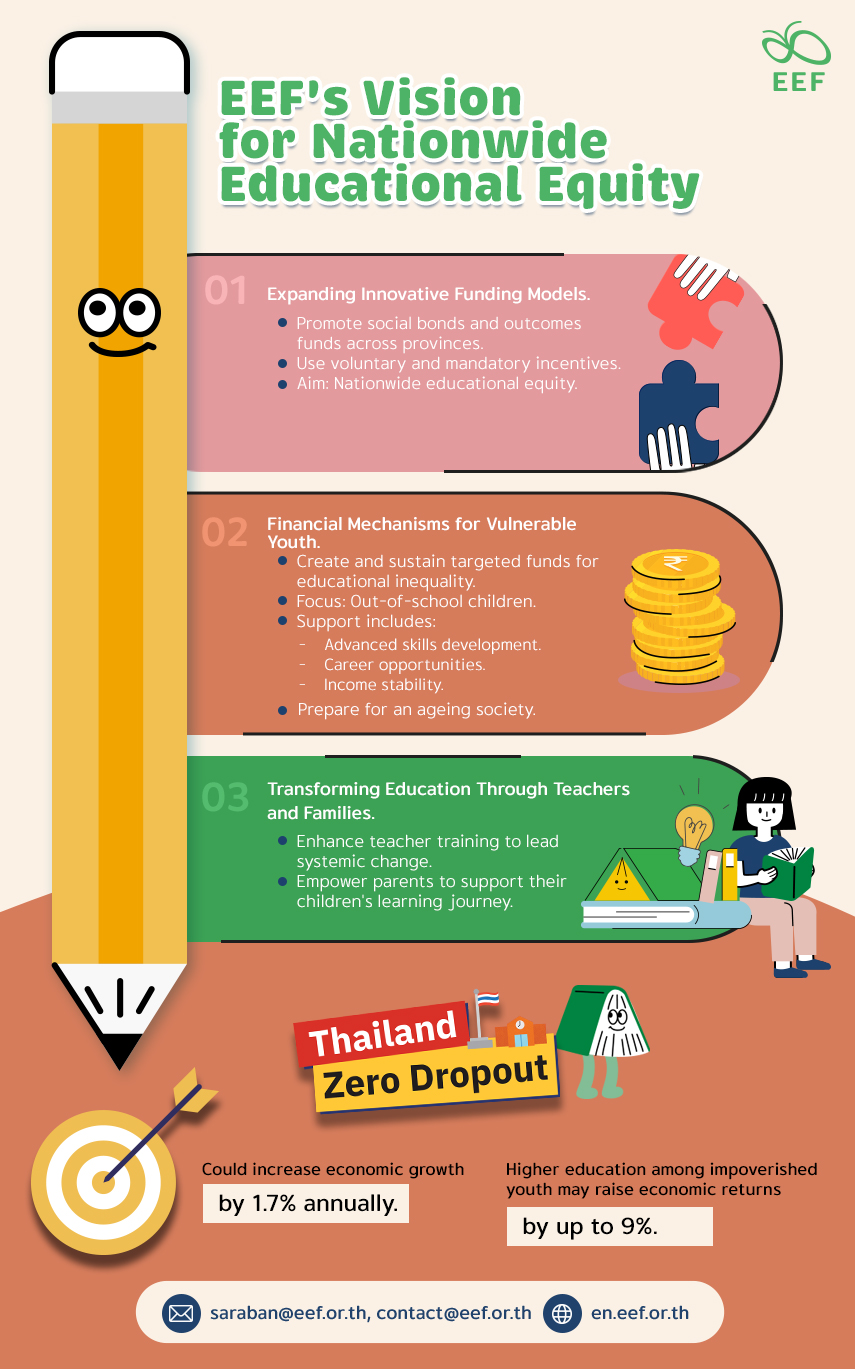
The EEF envisions For Nationwide Educational Equity
- Expanding the use of social bonds and outcomes funds to other provinces, paired with voluntary and mandatory incentives, to achieve nationwide educational equity.
- Developing and sustaining financial mechanisms and funds targeting educational inequality, focusing on out-of-school children by promoting advanced skills development, providing career opportunities, ensuring income stability, and offering lifelong learning tailored to their needs in preparation for an ageing society.
- Enhancing teacher training to drive systemic change in education and empower parents to actively support their children’s learning.
Achieving the “Thailand Zero Dropout” goal could boost economic growth by 1.7% annually,
with higher education levels among impoverished youth
potentially increasing economic returns by up to 9%.
Among the most compelling demonstrations of this cross-sectoral, reform-driven model is UNICEF’s collaboration with governments, private sectors, international agencies, and civil society, wherein strengthened data systems, increased funding, and child-friendly policies address the root causes of structural inequalities. This approach strongly resonates with the EEF’s mission: to harness partnerships, data-driven insights, and community engagement in crafting sustainable solutions that grant every child the opportunity to thrive in a fair educational system.
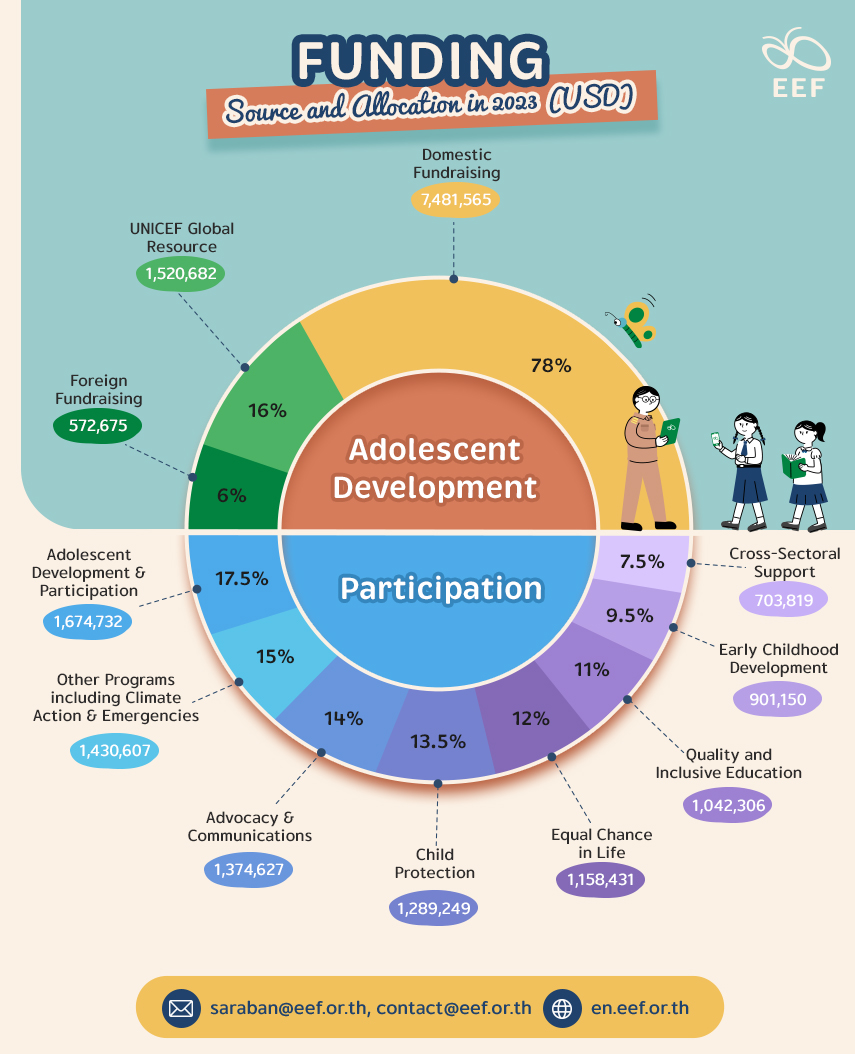
Funding Source and Allocation in 2023 (USD)
Foreign Fundraising: 572,675
UNICEF Global Resource: 1,520,682
Domestic Fundraising: 7,481,565
Funding Allocation
- Adolescent Development & Participation: 1,674,732
- Other Programs including Climate Action & Emergencies: 1,430,607
- Advocacy & Communications: 1,374,627
- Child Protection: 1,289,249
- Equal Chance in Life: 1,158,431
- Quality and Inclusive Education: 1,042,306
- Early Childhood Development: 901,150
- Cross-Sectoral Support: 703,819
Profound are the implications of the Equitable Education Fund (EEF) Thailand’s efforts for the future of education in Thailand. Through innovative financial mechanisms, cross-sector partnerships, and targeted support for vulnerable groups, the foundation builds not only pathways to immediate educational access but also lasting economic resilience. Reintegration of out-of-school children, career readiness initiatives, and lifelong learning programs do more than address urgent needs; they lay the groundwork for a skilled workforce, national economic growth, and systemic change within education. As these efforts scale, the EEF’s model may well inspire further reforms, greater collaboration, and sustainable progress toward reducing educational inequality while advancing broader social development goals.
All For Education is all about people; only when all is in for education is Education For All. Join the movement to reduce educational inequality. Support the EEF by donating to fund research, partnerships, and assistance for children, youth, and adults in need of educational support. Click the link to contribute today and help create a society where education is open and equal for all. Together, we can make a lasting impact.

